
in this issue May/June 2001, Vol. 5 No. 3
- Features
- People Profile
- Agency Profile
- Opportunities
- Resource Reviews
- News and Needs
- Web Site Review
"New" World Orders Are Always Orchestrated for Lay Ministry
feature
by Bruce Sidebotham
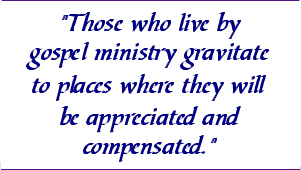 Two Filipinos were beheaded in 1995 in Saudi Arabia because of their Christian
testimony. Even though the Saudi government pressures local companies to fire
and deport expatriates active in secret worship, they cannot stop the demand
for these workers and their intrinsic testimony.
Two Filipinos were beheaded in 1995 in Saudi Arabia because of their Christian
testimony. Even though the Saudi government pressures local companies to fire
and deport expatriates active in secret worship, they cannot stop the demand
for these workers and their intrinsic testimony.
For the most part, it is not ordained clergy who are spreading the gospel to unreached lands, but lay people. As the ox that gets to snack while treading out the grain won't work well when he is muzzled (1Tim. 5:17-18, 1Cor. 9:9-13), so men and women who make their living as ministers of the gospel rarely go to places where they won't be appreciated and compensated.
Of 4.2 million full-time Christian workers worldwide in 1990, only 30 thousand (0.7%) worked among people for whom no church existed. Down through history, that proportion of professionals ministering to believers versus those trying to reach unbelievers has been typical. Consequently, for spreading the gospel, it is the laity who have been most significant.
After the Holy Spirit descended, the apostles stayed with the flock in Jerusalem. When persecution scattered the new believers, the apostles still "Those who live by gospel ministry gravitate to places where they will be appreciated and compensated."stayed in Jerusalem. Consequently it was the amateurs who took the gospel to Judea and beyond (Acts 8:1,11:19). It was Philip, a Greek, who preached the gospel in Samaria. Peter and John later went there to investigate after a group of converts had already been established. Peter didn't go to Cornelius until after this Roman centurion sent for and, with God's help, persuaded Peter (Acts 10) to come and preach to his already God-fearing household. To find the apostles after being baptised in Damascus, Paul had to go back to Jerusalem. In Antioch, where the believers were first called Christians, it was Barnabus from Cyprus who, along with Paul, shepherded the flock. Finally, Paul, whose ambition it was "to preach the gospel where Christ was not known" (Rom. 15:20), did so mostly by supporting himself (Acts 20:34, 1 Cor. 9:6, 2 Thes. 3:7-8).
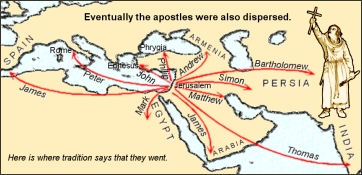 The apostles were the foundation (Eph 2:20) and were eventually forced to
disperse from Jerusalem, but it was the personal witness in the everyday lives
of the new believers that turned the world upside down. Soldiers shared with
soldiers. Prisoners converted their guards. Slaves won over their masters.
Wives convinced their husbands. Eventually, faith in Jesus permeated the whole
Roman Empire.
The apostles were the foundation (Eph 2:20) and were eventually forced to
disperse from Jerusalem, but it was the personal witness in the everyday lives
of the new believers that turned the world upside down. Soldiers shared with
soldiers. Prisoners converted their guards. Slaves won over their masters.
Wives convinced their husbands. Eventually, faith in Jesus permeated the whole
Roman Empire.
Once the Empire itself was converted, it was not priests of the state church
who first took news of Jesus to the barbarian tribes, but exiles who could
not abide the council established creeds. Then, it was not the state church
professionals who took orthodoxy beyond state boundaries, but the barbarians
who found orthodoxy when they invaded and destroyed the western part of the
Roman Empire. It was not church planting teams which established Christian
faith among the Lombard and Saxon tribes of Western Europe, but the armies
of Charlemagne. It was not missionaries to Scandinavia who civilized the Vikings,
but the captured women and children who became their wives and slaves. It
was not evangelists who tried to carry the cross back to Muslims in the Holy
Land, but violent Crusaders. 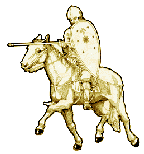 It was not preachers who took Christian faith across the Atlantic to North
and South America and sub-Saharan Africa, but conquistadors, explorers and
colonial settlers. When the emperor of China asked Marco Polo to have the
church send one hundred priests to teach the gospel in China, only two were
sent, and they never reached China.
It was not preachers who took Christian faith across the Atlantic to North
and South America and sub-Saharan Africa, but conquistadors, explorers and
colonial settlers. When the emperor of China asked Marco Polo to have the
church send one hundred priests to teach the gospel in China, only two were
sent, and they never reached China.
Of course, there have been some noteworthy exceptions to the general rule. The Apostle Paul did receive some financial assistance for his missionary work from a few churches (Phil. 4:10-19, 2Cor. 11:9) Saint Patrick (400s) took Christianity to Ireland. Saint Boniface and Celtic monks (700s) preached the gospel to pagan tribes in Germany. Francis of Assisi (1200s) tried to take the gospel to Syria and Raymond Lull (1200s) tried to take it to Algeria. Jesuit priests (1500s) went to India, S.E. Asia, China, and Japan before colonial powers arrived.
Most of Protestant Christianity's first missionaries, like the apostle Paul, supported themselves through various trades and enterprises. Great breakthroughs were often made by tradesmen and entrepreneurs. The first Protestant missionary to India, William Carey, supported himself by making shoes. The first Protestant missionary to the interior of China, Hudson Taylor, got there as a medical doctor. The first translation of the Bible into Chinese was done by the British diplomat, Robert Morrison. The first published translation of the New Testament into a particular Sumatran language spoken by over seven million people was facilitated by me when I was teaching English at a university there.
Fully supported Protestant missionaries to pagans in foreign lands are a recent and disappearing phenomenon. Most of the unreached world has always been inaccessible to those who earn their living by gospel ministry. Consequently, "new world orders" have always been divinely orchestrated to facilitate evangelism through lay Christians. God will use lay men and women with cross-cultural exposure for cross-cultural ministry.
The Ancient Silk Road Is a Highway to the Muslim
World
People Profile
from a pamphlet by the AD2000 and Beyond Movement
A Strategic History
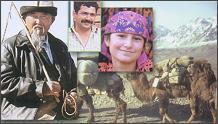 Caravans brought peoples, goods, ideas and religions along the Silk Road.
Fabulous cities emerged from dusty mirages. Oasis pools cooled camel trains.
Travelers traded, talked, and hauled the treasures of faraway lands. Silks,
gems, spices, fine porcelain, furs, paper, and gunpowder came from the east.
Gold, silver, cosmetics, perfumes, and glass flowed from the west. Noodles
at one end became spaghetti at the other. Along the way men shared religion
in fear of uncertain fate. They sought the blessings of gods for safety and
prosperity.
Caravans brought peoples, goods, ideas and religions along the Silk Road.
Fabulous cities emerged from dusty mirages. Oasis pools cooled camel trains.
Travelers traded, talked, and hauled the treasures of faraway lands. Silks,
gems, spices, fine porcelain, furs, paper, and gunpowder came from the east.
Gold, silver, cosmetics, perfumes, and glass flowed from the west. Noodles
at one end became spaghetti at the other. Along the way men shared religion
in fear of uncertain fate. They sought the blessings of gods for safety and
prosperity.
At the center bubbled the cauldron of Central Asia. Nomadic tribes spilling out of the steppes invaded dying civilizations and great empires. Armies poured into the cauldron to battle for dominion over strategic passes.
People along the Silk Road have been blown here and there by the prevailing winds of power. Vast migrations of refugees, nomads, and invaders have passed down the Silk Road, seeking freedom, peace, land, wealth, and power.
The armies of Aiexander the Great and Genghis Khan trod the Silk Road, together with merchants like Marco Polo and Ibn-Batuta. Missionaries, merchants, and mystics left their footprints. Buddhists sculpted massive images in rock. Nestorian monks carved Scriptures in stone. Sufi holy men whirled in ecstatic dance and were buried in marble shrines. Franciscan friars left their memoirs in the vaults of the Vatican.
This history shaping highway cuts across the heart of the modern Turkic World. Almost 90 percent of over 145 million Turkic speakers in the world live along the Silk Road in the Turkic Window, between 35 and 45 degrees latitude and between Skopje, Macedonia and Urumchi, China. They share a common homeland, a common culture, and a common heritage.
The Turkic World, however, is not a unified political bloc. Until recently, most of the Turkic peoples living between Macedonia and Mongolia called themselves Turkestanis or Turkis. When Russia and China divided up Central Asia at the end of the eighteenth century, they pursued a "divide and conquer" policy against Turkic unity, creating separate ethnic identities and rivalries.
Many Turkic peoples of the Silk Road do not accept a common Turkic identity as a political agenda. In the wake of the Cold War, Islam manipulates Turkic affinities of language and culture as a unifying political and social force. While recognizing the Turkic cultural affinity, Christians should also be sensitive to ethnic identities. Azerbaijanis, Uzbeks and Uyghurs are distinct, despite their similarities.
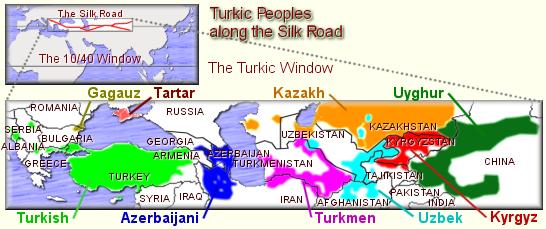
A Militant History
From the dawn of time the Eurasian grasslands have nurtured hordes of fierce warriors. Riding strong shaggy ponies, they overran cities and civilizations from Persia to China. Some of the nomads settled as farmers and traders and built strong cities with high cultures. In time, they too were invaded by new hordes. From the Huns to the Mongols, these barbarians were feared as far away as Rome and Vienna.
The earliest wave of Eurasian nomads, Scythian and Saka tribes described by Greek historians, lasted from the eighth to third century BC. Then came the Huns, who terrorized the empires of China and Rome from the third century BC to the sixth century AD. To stop them the Chinese built the Great Wall. The empire of the Huns, considered the forefathers of the Turkic people, reached its zenith under Attila who advanced to the very gates of Rome.
From the sixth to the twelfth century Turkic cavalries won decisive victories until they ran a vast domain called the Turkic Khaganate. The Seljuk and Oghuz Turks ruled from Turkey to India. They took Jerusalem, fought Crusaders and stormed the walls of Byzantium.
In the Tarim Basin's oases of today's northwestern China, the Uyghurs founded a sedentary empire that controlled Silk Road trade between Persia and China for many centuries.
From the thirteenth to fourteenth centuries the Mongols with the Tatars established the largest empire in the history of the world. Founded by the infamous Genghis Khan and expanded by his sons and grandsons, the Mongol hordes ruled vast tracts of Russia, China, Persia, and Asia from the Black Sea to the Yellow River.
A Turk from Samarkand, Timur the Great, better known as Tamerlane, was the last of the great Silk Road conquerors. Born in 1336 AD, he aspired to become a Mongol Khan. Instead, he destroyed the Mongol Empire, drove the Ottoman Turks deeper into Europe, and wiped Nestorian Christianity from Central Asia. In his wake, he left pyramids of skulls in the ashes of the cities he burned.
The peoples of the states of Central Asia share a common past that disappears into the mists of history. The Silk Road is still a path of dreams and visions. Central Asia is still contested between East and West, where democracy and capitalism confront communism and where Islam and Christianity warily circle one another. The treasures of the old Silk Road still beckon to traders, armies, and religions.
A Present Revival
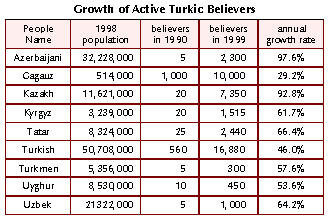 God is working among all the Turkic peoples. Faith in Jesus is reemerging
along the ancient Silk Road. Most Central Asian nations had only a handful
of believers in 1990. Today most of them have thousands. Over 43,000 active
Turkic believers are reported in more than 350 fellowships compared with about
1,600 total believers in Jesus less than ten years ago. Never before in history
has there been so much response among Turkic peoples.
God is working among all the Turkic peoples. Faith in Jesus is reemerging
along the ancient Silk Road. Most Central Asian nations had only a handful
of believers in 1990. Today most of them have thousands. Over 43,000 active
Turkic believers are reported in more than 350 fellowships compared with about
1,600 total believers in Jesus less than ten years ago. Never before in history
has there been so much response among Turkic peoples.
In 1992, one man was studying at college. A friend invited him to a church meeting. On the third visit he gave his life to the Lord. It was a difficult time in his life. His oldest daughter was paralyzed as a child and could not walk. His wife had tuberculosis. He had to work nights. He cried out to God for help. After he prayed for the eldest daughter she was healed.
God led him to begin a fellowship among his people and plant churches in other villages. Without any idea of how to start a church or how to train leaders, he began to visit villages, preaching the gospel and praying for the people. He saw people set free from demons and healed. Upon leaving a village he would appoint a leader to watch over the group of new believers. In just twelve years, churches have been started in some 40 villages across national boundaries and among several different people groups.
One of the most dramatic advances of the Gospel in the last decade may well be among the twenty million or so Azerbaijanis living in Iran. A reliable source confidently estimated that about one quarter of all Iranian churches, both in Iran and outside, are people from an Azerbaijani background.
Especially rapid growth has occurred among the Turkish-speaking people of Bulgaria, among the Kazakhs, and among the Gagauz in Moldova.
The 250,000 strong Gagauz Turkic tribe migrated out of northwestern China in the Middle Ages. They settled along the western shores of the Black Sea, where they became nominally Orthodox. By the end of 1995 ten thousand Gagauz -- four percent of the population -- had become active believers in Christ. Revival is sweeping through the Gagauz people. Every village and town in their five provinces has at least one house church. Young Gagauz believers have expressed a desire to reach their Muslim cousins along the Silk Road.
About 8,000 Gagauz came to open-air meetings in Moldova to hear Turkish-speaking Christian Bulgarians, Azerbaijanis, and Turks from Turkey. Because they speak a dialect close to Anatolian Turkish, they could easily understand the speakers. Professor Ivan from the Komrad Gagauz University invited them to speak in his classes. As an atheist wanting to broaden his perspective on Renaissance painting, Ivan began reading the Bible in the early nineties, and the Bible renewed him. Now he carries his Bible unashamedly into lectures, knowing that his students will ply him with questions about proving the existence of God.
Along the ancient Silk Road a gateway of opportunity has opened. Dramatic changes are sweeping through again as communism moves out and market economies move in. Fledgling governments are restructuring everything from education to constitutions. Not for one thousand years has there been so much freedom to share the gospel with Turkic peoples.
This freedom may not last. The same factors opening the gateway may close it. Nationalistic fervor mixed with Muslim fundamentalism could close the door on Christianity if it is branded as a foreign faith. However, given a firm foothold, Turkic believers could spread the gospel to the rest of the Muslim world.
Straddling Four Countries, Kurds Anchor a Middle
East Evangelism Strategy
People Profile
from an acticle by Matthew Hand and Mark Brockman posted
at www.itnet.org
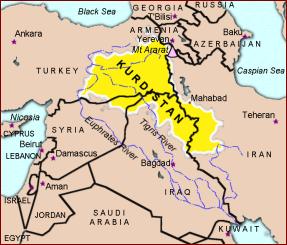 For nearly 3000 years the Kurds have lived at the Tigris and Euphrates headwaters
in the mountains and valleys below Ararat. Theirs was the empire which put Daniel
in the lion's den, and theirs was the culture of the Zoroastrian priests, called
Magi, who followed the star to Bethlehem.
For nearly 3000 years the Kurds have lived at the Tigris and Euphrates headwaters
in the mountains and valleys below Ararat. Theirs was the empire which put Daniel
in the lion's den, and theirs was the culture of the Zoroastrian priests, called
Magi, who followed the star to Bethlehem.
Kurds today are mostly tribal, living a nomadic lifestyle in a homeland divided up by Turkey (55%), Iran (23%), Iraq (17%), and Syria (4%). In these countries, the Kurdish must be secretly feared. For centuries they have marginalized, harassed, attacked, and even slaughtered. The mountains are their only friends.
In Turkey, the Kurds are officially called "mountain Turks" who through poverty and isolation lost their mother tongue. Systematic intimidation and strict security measures have been tried to force their assimilation. The current war against Kurdish separatists has claimed over 20,000 lives and displaced over two million.
In Syria (at least for the present since Syria resents Turkish damming of Euphrates water), the Kurds find safe haven from which to operate against Turkey. Guerillas of the Marxist Kurdistan Workers Party (PKK) actually train in the Syrian controlled Bekka Valley of Lebanon.
In Iran, some cultural expression is allowed, but entire villages were wiped out following the 1979 revolution in order to keep the Kurds underneath the fundamentalist Islamic state.
In Iraq during the 1980s, Saddam Hussein tried to systematically eliminate the Kurds. Up until the Gulf War, he had managed to destroy 4000 settlements and 200,000 lives (some of them with poison gas).
After Iraq's defeat, the Allies established a free area for Kurds in a "no-fly zone" above the 36th parallel. For five years this area became a miniature de-facto Kurdistan within which many western relief agencies operated. It was also the headquarters for the CIA-backed Iraqi National Congress, whose real purpose was to overthrow Saddam Hussein, but deep political divisions thwarted that attempt.
The two main political groups, the Patriotic Union of Kurdistan (PUK) and the Kurdistan Democratic Party (KDP), had been rivals for decades. With a real Kurdistan appearing, the stakes were raised. Under an American imposed cease fire both sides plotted for supremacy by building alliances with America's enemies; the PUK with Iran and the KDP with Iraq.
Suddenly, on 31 August 1996, Saddam Hussein's forces moved rapidly into the "safe haven" creating a major international crisis. Feeling betrayed by the Kurd's alliances, the US withdrew all of its people and support. Many of the Kurds and Arabs who had collaborated with the CIA were hunted down to be tortured and killed. Some, along with their families (about 3000), were evacuated to Guam and then resettled in the USA.
Officially, the USA said, "We gave the Kurds every opportunity for five years . . . and the Kurds failed to meet this great historic opportunity for the Kurdish people. It's their responsibility for what's happened in the north."
In northern Iraq, the US still patrols the no fly zone, and civil war among the Kurds continues.
Strategists for world evangelization and church growth have long considered the Kurds strategic. They straddle political and cultural borders and speak all the major Middle Eastern languages. Also, Kurdish allegiance to Islam is not as strong as it is among other Middle Eastern peoples.
Many Kurds still feel connected with their ancient Zoroastrian heritage, and most recognize that their principal oppressors for the last 1000 years have been fellow Muslims.
Today, thousands of New Testaments are in use by Kurdish seekers, and small Kurdish led Christian fellowships are forming.
Turks of Turkey Are at an Unprecedented Crossroads
people profile
from an Operation Reveille Area Study
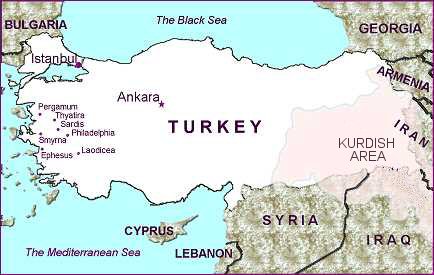
Once home to the seven churches of Revelation and the center of gravity for early Christian civilization within which the great creeds were formulated, Turkey may be the largest least evangelized country on earth.
 Among 55 million Turks, 14 million Kurds, and one million Arabs, about 1500
Evangelicals meet in fewer than two dozen churches. Greek and Armenian minorities
supply another 90,000 Christians of Orthodox and Catholic persuasions. Consequently,
Turkey has roughly one tiny church for every three million people.
Among 55 million Turks, 14 million Kurds, and one million Arabs, about 1500
Evangelicals meet in fewer than two dozen churches. Greek and Armenian minorities
supply another 90,000 Christians of Orthodox and Catholic persuasions. Consequently,
Turkey has roughly one tiny church for every three million people.
What happened?
Asia Minor was Islamicized in much the same way that North America was Christianized. As Europeans overwhelmed and displaced American Indians, so the Central Asian Turkish tribes overwhelmed and displaced the natives of Asia Minor; but not without bitter fighting.
As recently as 1900, Turkey was 22% Christian. That was before three million independence seeking Armenians were exterminated in genocide.
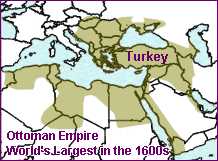 When the Seljuk Turks, operating from Baghdad, expanded their empire into
the "holy land," Christian Europe fought for two centuries with the Crusades
to hold them back.
When the Seljuk Turks, operating from Baghdad, expanded their empire into
the "holy land," Christian Europe fought for two centuries with the Crusades
to hold them back.
Then the Ottoman tribe of Turks conquered Constantinople in 1453 and replaced the Byzantine Empire with their own, which by 1600 reached deep into Europe, North Africa, and the Middle East.
While in Central Asia, the Turkish tribes had followed either Animism (worshiping many gods in nature) or the Nestorian cult of Christianity (denying the full divinity of Jesus). As they absorbed Islam and settled new lands, mystical elements of their heritage like Whirling Dervishes and the Evil Eye remained. Accordingly, even today, Turkish religion at the level of daily living consists more of superstition and folk magic than of keeping the pillars of Islam.
Stacked upon layers of preceding civilizations and perched on the fault line between East and West, cultural forces in modern Turkey clash like tectonic plates. Kurdish separatists fight for independence in the impoverished east. Large numbers are fleeing the backward countryside to overpopulated industrial cities. Secular progressives agitate to speed modernization, while radical fundamentalists press for strict Muslim law amidst widespread corruption and moral decay.
The earthquake of August 17, 1999 gives us a metaphor for the cultural upheaval. By it, the Turks mark time "before the earthquake and after the earthquake," and through the cracked social fabric it symbolizes, an indigenous church has been emerging.
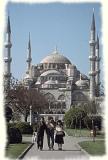 Fourteen years ago Turkey had only two Evangelical congregations. These were
in Istanbul. Today over a dozen fellowships meet in owned or rented properties
throughout the country, and several other fledgling groups meet in homes.
By establishing legal identities, Turkish Christians are gaining confidence
and becoming more mainstream. Arrests and police harassment continue, but
the courts are supporting religious freedom and attitudes are changing.
Fourteen years ago Turkey had only two Evangelical congregations. These were
in Istanbul. Today over a dozen fellowships meet in owned or rented properties
throughout the country, and several other fledgling groups meet in homes.
By establishing legal identities, Turkish Christians are gaining confidence
and becoming more mainstream. Arrests and police harassment continue, but
the courts are supporting religious freedom and attitudes are changing.
For centuries, popular opinion in Turkey has been that Christianity was subversive. Turks have felt about relatives following Jesus the way you and I might feel about a son or daughter becoming homosexual. Channeling some earthquake relief through a handful of Turkish congregations gave Turkish believers their first positive high profile since the Crusades and a big opportunity to vindicate themselves. A Christian FM radio station now broadcasts 24 hours a day in Europe's largest metropolis, Istanbul, and annual demand for Turkish language New Testaments and Bible study material steadily increases.
Asia Minor stands at a crossroads unprecedented since the days of the Apostle Paul. Seventy percent of its people live in urban centers and forty percent are under fifteen years old. Istanbul's skyline reveals its emptiness and thirst. In it thousands of minarets reach towards heaven along with tens of thousands more satellite dishes. While Islam calls from the one and secular paganism beams into the other, the church of Jesus is quietly growing.
Resouce Contact Information
| Resource Contact Information | ||
| Resource | Phone Number | Web Site / Address |
| Turkish Language Videos:
JESUS Video Jesus Film Project The Ransom Multi-Language Media Yonkeo Intercom Ali & Silvana Firm Foundation |
1-800-560-8713 1-717-738-0582 1-219-267-5834 - |
www.jesusfilm.org www.multilanguage.com - 14 Hurst Way, Sevenoaks, Kent TN13 1QN, England |
| Turkish Language Audio
Tapes: Audio Scriptures International Gospel Recordings |
1-760-745-8105 1-213-250-0207 |
www.gospelcom.net/asi members.aol.com/glorenet |
| Turkish Language Gospel
Radio: World by 2000 Database Radio Kumru |
1-719-548-7490 - |
www.wb2000.org www.radyokumru.com |
| Turkish Language Scriptures: International Bible Society American Bible Society Scripture Gift Mission |
1-800-524-1588 1-800-322-4253 1-877-873-2746 |
www.gospelcom.net/ibs www.americanbible.org www.gospelcom.net/asgm |
| Turkish Language Christian
Books: Multi-Language Media World Missionary Press |
1-717-738-0582 1-219-831-2111 |
www.multilanguage.com www.wmpress.org |
| Turkish Language Tracts:
Chick Publications Fellowship Tract League No Frontiers (UK) |
1-909-987-0771 1-513-494-1075 44 (0) 1424-772814 |
www.chick.com/catalog/TractLookUp.asp www.biblebelievers.com/FTL1.html www.nofrontiers.com |
| On Line Scriptures: |
- |
www.incil.com www.funet.fi/pub/doc/bible/html/turkish |
| Turkish Language Bible Courses | - | www.kutsalkitap.org |
| Turkish Testimonies & Articles | - | www.answering-islam.org/Turkish |
| Turkish Four Spiritual Laws | - | www.greatcom.org/laws/languages.html |
| Pen Pal Ministry to Turks | 1-970-434-1942 | www.missionsalive.org/two |
| Video on Turkey | 1-970-434-1942 | www.missionsalive.org/two |
| Unreached Peoples Tools & Info | 1-303-730-4170 | www.calebproject.org |
| Online Directory | - | www.missionresources.com/turkish.html |
Agency Contact Information
| Agency Contact Information | |||
| Minsitry | Agency | Phone Number | Web Site |
| Education | Tyrannus Bible School | - | www.tyrannus-bibleschool.org |
| Mobilization & Networking | Turkish World Outreach
International Turkey Network |
1-407-826-2800 - |
www.missionsalive.org/two www.itnet.org |
| To Expatriates in Turkey | Cleft of the Rock | 1-800-755-7955 | www.cleftoftherock.org |
| Evangelism & Church Planting | Frontiers Mission to Unreached Peoples Pioneers Turkish World Outreach |
1-800-GO-2-THEM 1-888-847-6950 1-800-755-7284 1-970-434-1942 |
www.frontiers.org www.mup.org www.pioneers.org www.missionsalive.org/two |
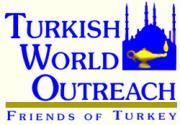 Turkish World Outreach
Turkish World Outreach
Targets Turks All Around the World
agency profile
Turkish World Outreach was founded in 1969 as Friends of Turkey, and continues
its postal evangelism ministry under that name. The purpose of TWO is to evangelize
Turks by any means possible. Initially, the best means was to invite Turks to
know more about Jesus through letters sent by Christians. Each month throughout
the world, thousands of letters are mailed to Turks in many countries telling
them about the love of Jesus.
Over the years, TWO has expanded its ministry beyond the boundaries of the country of Turkey to include all Turkic peoples and the following activities:
- Enabling missionaries to minister in the Turkic world
- Planting churches within Turkic communities
- Mobilizing prayer for Turk peoples
- Coordinating a pen-pal ministry to Turks
- Providing free Scriptures, literature and videos for Turk ministry
- Helping those ministering to Turks find support for their activities
- Helping Turkic believers reach other Turkic peoples
- Facilitating Scripture and Christian literature translation
- Facilitating Turkic language gospel broadcasts
TWO works through teams of people with similar ministry objectives and complementary gifts located in strategic areas until an indigenously led church begins reproducing itself.
TWO is looking for people who will either take or send the gospel among Turk peoples.
For more information, contact:
Field Director, Turkish World Outreach
508 Fruitvale Court
Grand Junction, CO 81504, USA
Phone: (970)434-1942
Fax: (970)434-1461
e-mail: TWO@onlinecol.com
Internet: www.missionsalive.org/two
Prayer Walking Lets You Have Eternal Impact Overseas
opportunity
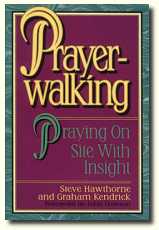 Ordinary believers are stepping into the streets with eyes wide open to
real needs and with ears attuned to the promptings of God's Spirit. Intercession
is becoming an adventure rather than a duty.
Ordinary believers are stepping into the streets with eyes wide open to
real needs and with ears attuned to the promptings of God's Spirit. Intercession
is becoming an adventure rather than a duty.
This book, Prayer Walking: Praying On Site With Insight by Steve Hawthorne and Graham Kendrick, combines practical proven ideas with Biblical insights. It shows how to pray in a community as well as for a community.
Military Christians whom God is sending to exotic lands are going to love this story-filled guide to "shoe-leather" intercession.
Order it from HarvestLogos.com and a portion will help support Missions to Unreached Peoples which sponsors Operation Reveille.
 PeoplesFile CD-Rom
PeoplesFile CD-Rom
Will Help You See the World as God Does
resource review
Are you curious about the status of Bible translation? Want to know what native
languages are spoken?
Global Mapping International has integrated the best and sometimes obscure information to produce this fact book and atlas of all the world's cultures and languages from a church growth perspective.
This $40 CD replaces hours, even days, of library and Internet research. The information is not only listed, but it is also plotted. Some of the data was previously only swapped privately by church growth researchers. The CD is fully indexed with features allowing you to find related material and make complex queries.
Order from:
Free Area Study Fact Sheets on Turkey Are Available
from Operation Reveille
resource review
National media bombards us with the political, historical, social, and economic
factors affecting Asia Minor, but what about the spiritual factors? What is
God doing there and with what can it be supported?
OpRev's double sided Fact Sheet on Turkey provides insight as well as contact information for resources and ministering agencies that no mature Christian serviceman or woman should be without.
Digital and hard copy versions of the fact sheet are free to military personnel and ministries to military.
Reconciliation Walk Retraced Crusader Steps
news and needs
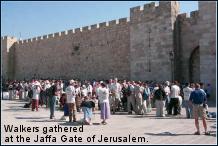 Just over nine hundred years ago, on 15 July 1099, Crusaders breached the walls
of Jerusalem. They slaughtered men, women and children throughout the day and
well into the night. As the sun rose, they discovered about 6,000 Jews who had
fled to the synagogue for refuge. They set the synagogue alight and burned them
alive. The surviving Muslims had fled to the Mosque of al Aqsa in the south-
eastern quarter of the city. The Crusaders broke down the doors and slaughtered
an estimated 30,000 women and children.
Just over nine hundred years ago, on 15 July 1099, Crusaders breached the walls
of Jerusalem. They slaughtered men, women and children throughout the day and
well into the night. As the sun rose, they discovered about 6,000 Jews who had
fled to the synagogue for refuge. They set the synagogue alight and burned them
alive. The surviving Muslims had fled to the Mosque of al Aqsa in the south-
eastern quarter of the city. The Crusaders broke down the doors and slaughtered
an estimated 30,000 women and children.
This event and the next two centuries of intrigue, betrayal and war convinced Muslims there was no greater evil than these barbaric Christian hordes from feudal Europe. Toward the end of the thirteenth century, the Muslims finally expelled the last of the European invaders, but Christian/Muslim relations have been poisoned ever since.
Since 1995 the Reconciliation Walk has been retracing the steps of the first Crusaders up the Rhine, down the Danube, across Turkey, and into Jerusalem. On the eve of 15 July 1999, some 430 Christians representing 33 different nations gathered at the Church of the Redeemer. Many in the group had participated in previous portions of the walk over the past three years. They offered prayers of peace and reconciliation.
Lynn Green reminded the assembly: "The Reconciliation Walk began as a simple step of obedience. In taking this step, it has been a privilege to see the doors of hospitality open in each country in the Middle East. Over 2,500 Westerners have been received with gratitude and warmth for their willingness to come and to deliver this simple apology. In the process, Westerners and Easterners have found their prejudices, opinions, and fears of each other challenged and changed."
As the group acknowledged the wrongs of the Crusades and prayed for an end to the enmity and bitterness that have been their legacy, Prince Albrecht zu Castell of Germany joined in. As a member of the German nobility, he traces his ancestry to knights who took part in the Crusades. He spoke to the group, and then read his prayer of repentance.
The following day participants climbed the city walls to pray for God's blessings over the region. As one participant, Markus, paused at the ticket office to explain what the group was doing, the Palestinian ticket seller looked him deep in the eyes and told him, "You have to do this." The walkers fanned out to encircle the old city as much as possible. When stationed all around, the group prayed for the peace of Jerusalem and for God's blessings upon the people of the Middle East.
The walkers did not pray against anyone or anything. They prayed . . .
- for ethnic groups in the city,
- for trust between religious leaders,
- for peace and reconciliation,
- for friendships across ethnic lines,
- that people would be treated more sacredly than territory,
- that visitors and outside powers would be instruments of peace and reconciliation instead of division,
- and that the participants themselves would understand the people of this region.
As the walkers filed down from the walls, they spread out into the old city to continue sharing the message with shopkeepers, shoppers, and worshippers. In addition, delegations visited representative heads of the faiths damaged by the Crusader's wars.
An Angel Showed Kurd God's Way
news and needs
I am a Kurd that became a Christian. The following is my story. It all started
in late 1980s when I was detained by the Iranian police for no reason. They
thought that I had some connections with Kurdish political parties that were
opposing the Islamic Republic. I did not have any connection with any political
party or anything of that sort. Months went by without even letting my family
know where I was. Finally, the day came where I was brought into court. The
judge asked me three question that were asked to many people.
What is your name? -- I said Zana.
What is your ethnicity? -- I said I am a Kurd.
What is your religion? -- I said that I am a Sunni Muslim.
I was taken out of the court, thrown back into my cell, and I was beaten all night. Next morning, they put me on a bus, and we were headed back to Mahabad, my city in Kurdistan.
 On the bus I was sitting next to a man. He opened his bag and took out a sandwich
which was wrapped in newspaper. I was very hungry, since I had not eaten regular
food in almost six months. I did not want to look at his food, but I just
couldn't stand the smell of the kabobs. He asked me if I would like one. Without
hesitating, as we usually do in Iranian culture, I asked for one. Instead
of one he gave me two out of the three that he had with him.
On the bus I was sitting next to a man. He opened his bag and took out a sandwich
which was wrapped in newspaper. I was very hungry, since I had not eaten regular
food in almost six months. I did not want to look at his food, but I just
couldn't stand the smell of the kabobs. He asked me if I would like one. Without
hesitating, as we usually do in Iranian culture, I asked for one. Instead
of one he gave me two out of the three that he had with him.
I asked for his name, and he said that his name was Yacub. I had never heard that name before. So I asked, "What kind of name is this?" He said "Hebrew." "Ahh, so you are a Jew?" I asked back. "No, I am a Christian," he said. I had heard lot of negative things about Christians, so I did not want to get into a conversation about it. But something inside me made me wonder why did he believe in it?
I asked if he believed that Jesus was the son of God. The answer was yes. How could God have a wife? How could God have sex? He started explaining that to say that God had sex with Mary is a great sin. But rather Jesus is the son of God in a spiritual way and not like the way we are born. And we never say that God ever had a wife. We believe in a holy God.
I wanted to stop the conversation and bring a different subject. I could not think of any, so I asked him why was he going to Kurdistan? He said that a friend needed some help with some-thing. I asked for his name. He said Zana. That was my name. But I thought he meant a different person. He opened his bag and very quietly gave me a Bible. He put it in my bag. He knew that if someone sees him with that book it could cost him his life. I asked what was it? He told me that I will find out later.
We got to Mahabad, and I came off the bus before he did. I got my bag and was waiting outside for Yacub (Jacob) to come off, but the bus was empty, and he still had not come out. I went to the driver and asked him where did the Man sitting next to me go? To my astonishment and confusion he said, "There was no man sitting next to you." Was I crazy or what! I said maybe I was dreaming. But, I still had the taste of the sandwich in my mouth. I still had the book in my bag. What was Yacub? Who was he? Why didn't he go to his friend's house? Then I remembered that the friend's name was Zana and only then realized he meant me.
I went home and found my mom in the house crying. She was so surprised and happy to see me. I asked what had happened since I was gone? I found out that soldiers were looking for me and that she was raped by a Jash (Kurdish for "traitor"). When I heard that, I felt like somebody was hitting me in the back with sticks. I went to my room and wept like a baby. I could not believe that this really happened.
That night when I asked for my older brother Hasan at dinner they all started crying. They told me that he was hanged. I felt like the food was going through my back. I could not eat. I got up and went to my room for some more weeping. I had nothing to do, so I took out the book and started reading. I was surprised. I had never seen anything like this. I read some in Genesis. I read in Injeel until Matthew chapter ten, and I just went to bed.
I still could hear my Mom and sister crying downstairs. The neighbors came to cheer them up and talk to them. Next morning I went and visited my brother's gave. Life became normal again until one night in my dream Yacub appeared and told me that I must leave my country. I knew something was up, so I went and hid at a friend's house. I did not want to leave the country.
Sometime after I sneaked back. I went to my house at night. I found that soldiers had been in my house, and they were looking for me. Now this time it was my sister that was raped by the soldiers for no reasons. My brother who was executed had some ties to the Kurdish political parties. But what have I done wrong, or what has my sister done wrong? Is this what they call an Islamic Republic? If it was not for my family I would have killed myself.
I knew that Yacub was telling me something. But what? Help me Yacub, what do you want me to do? I went to my room and packed whatever I could. I took the Bible with me and headed for the mountains crossing the borders into Iraq. I stopped in the middle of nowhere for a rest. I took out my book and read in it. When I came to Matthew 11:28 ("Come to me all who are heavy laden and weary and I will give you rest.") I was shocked and did not know what to think, because the book kind of read my mind. It had what my heart longed for.
Right there in the middle of the night I gave my life to Jesus Christ. I couldn't believe the changes that were happening inside of me. I felt a kind of peace that could not be expressed by words. I could feel all of the weight that I felt on my shoulders coming off. I now understood what was God and how he was like. It was a good thing that I did not commit suicide. The Lord had a plan for me. I now knew who Yacub was an angel. It was very hard to believe. But an angel would be the best answer.
I now forgave all of those that have done wrong to me. Instead of cursing I prayed for the salvation of the people who were beating me in prison. I am grateful for having such a wonderful experience.
French Anti-Sect Law Stirs Up Evangelical Concern
news and needs
by Mark Albrecht, World Evangelical Fellowship's Religious
Liberty e-mail conference Religious-Liberty@xc.org
On May 3rd the French Senate passed its long-debated anti-sect legislation,
which many feel could open the door to religious discrimination in Europe. It
will now be sent back to the National Assembly to be voted upon again in its
final form. It is widely feared the legislation will pass and be put into practice
within the next few months.
The final disposition of this bill is particularly important because of the precedent that France, as a founding member of the European Union, will set for states in Eastern Europe and the former Soviet Union, who are still in the process of formulating legislation which regulates religious groups and defines religious freedom.
Religious liberty advocates in Europe and the U.S. are concerned about the proposed French law to imprison religious "proselytizers, sects and cults" for up to two years for "mental manipulation" of the public. The bill aims to limit the spread of what French officials have called 173 "dangerous sects" in France. These include Jehovah's Witnesses and Scientologists, among many others.
Power is given to the state to dissolve religious groups and impose sentences of up to five years and fines of up to 500,000 French Francs. The bill aims to stamp out dangerous sects and cults in France, but it never defines them adequately. Representatives of many religious groups in France have expressed concern that if this bill is passed it will encourage discrimination on the basis of religious faith.
Small independent Protestant groups are particularly concerned. This latest version has been repeatedly criticised for being extremely vague and worded in such a way that it will allow "anyone with an interest" to begin potentially costly and damaging legal proceedings against legitimate religious organisations.
Last year French Justice Minister Elisabeth Guigou defended the bill by calling it "a significant advance giving a democratic state the legal tool to efficiently fight groups abusing its core values."
The push in Western Europe to form "sect commissions" and legislate against sects began after the 1994 and 1995 suicides and murders by Solar Temple members in Canada, Switzerland and France. France, Germany, Austria and Belgium set up commissions to list sects, which in Belgium include even the YWCA.
France is the first to propose legislation making so-called religious "mind control" a crime. No mechanism for dialogue with the government seems to exist, nor does there appear to be a possibility of being removed from the lists.
web site review
"Why I Chose Jesus?"
Read what Muslim background believers say at:
www.missionfrontiers.org/2001/01/muslim.htm